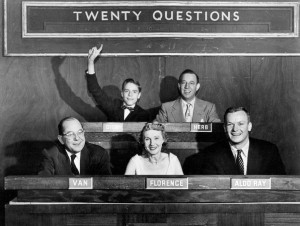The 3 Essential “Must Ask” Prospecting Questions
 Ever show up for a sales meeting you yourself scheduled and realized you shouldn’t be there? I don’t mean mixing up times and dates or going to the wrong address. I’m talking about driving 45 minutes to a meeting you never should have made in the first place.
Ever show up for a sales meeting you yourself scheduled and realized you shouldn’t be there? I don’t mean mixing up times and dates or going to the wrong address. I’m talking about driving 45 minutes to a meeting you never should have made in the first place.
I’m talking about qualifying prospects before you meet with them. Maybe I’m sounding harsh, but failing to properly qualify prospects is absolutely the biggest reason producers have bad experiences with telemarketing firms.
Qualification is a screening process. It shows you if a prospect is worth meeting, and it can also tell you lots more about their buying patterns, underlying insurance concerns, and satisfaction with the incumbent you’ll be competing with.
Everyone in sales inevitably learns the importance of qualifying prospects firsthand. Nothing beats getting burned for teaching you the dangers of a hot stove, but if we can save you any time and pain with our list of the top 3 essential qualifiers, maybe you’ll avoid some of that frustration from happening.
Is there any reason you couldn’t change agents if we can deliver worthwhile improvements?
This is the key qualifier that protects you from competing with someone’s agent brother-in-law, or a long-term customer and agent who refers thousands of dollars of windshield repair business to them annually.
It’s understandable that some people want to see what you have to offer just to keep their current agent “honest.” It’s also understandable that those are not the people you want to spend time trying to sell. This question works swimmingly because it addresses the issue succinctly and diplomatically, and will draw out an honest reply from the suspect.
Besides yourself, who else is involved in the decision process there?
An unfortunate reality of today’s marketplace is that buying decisions are often handled by people you may not even get to see. When the bookkeeper, Mary, agrees to meet with you for a competitive insurance review, you’ve got to sell both Mary and her boss (or the “executive committee” to whom she reports).
While that’s a less than favorable situation, knowing the process and the names and positions of the others involved can help you make the best presentation by addressing the concerns that everyone’s likely to have even if they won’t be at the meeting.
Have you investigated other insurance options in the last few years and if you have, what was the outcome?
The answers you get here will tell you plenty about the prospect’s process, goals, frustrations, values, etc.
“We’ve been with the same agent for 20 years, since we started the company.” That kind of answer might seem discouraging, but it doesn’t necessarily make the prospect a bad one. The agent might be less attentive these days, or maybe the business has grown and they need someone with more technical know-how.
If the prospect is only looking to cut costs, this question should reveal that. If they’ve recently changed agents because of an unsatisfactory claims issue or other problem, you’ll learn about that as well. Knowing their recent “shopping” history can tell you a lot about current possibilities.
If the prospect tells you they saved thousands of dollars last year when they switched to another agent who set them up with a 3-year policy, you can decide if this is the right time to go for a meeting or if waiting a couple of years is the better options all around.
Comments
The 3 Essential “Must Ask” Prospecting Questions — No Comments
HTML tags allowed in your comment: <a href="" title=""> <abbr title=""> <acronym title=""> <b> <blockquote cite=""> <cite> <code> <del datetime=""> <em> <i> <q cite=""> <s> <strike> <strong>